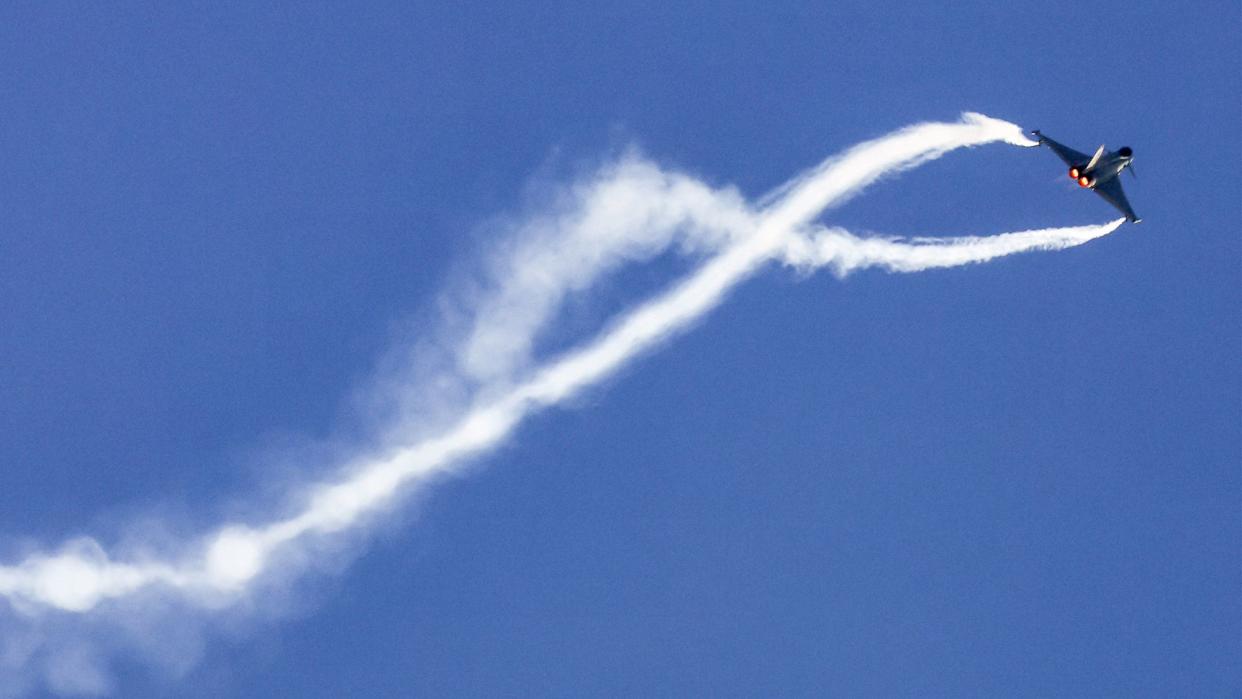Why is the UK pushing Germany on fighter jets for Saudi Arabia?

- Oops!Something went wrong.Please try again later.
- Oops!Something went wrong.Please try again later.
Rishi Sunak is pushing Germany to approve the sale of Europe's most advanced fighter jets to Saudi Arabia, ahead of an expected autumn visit to Downing Street by the oil-rich country's Crown Prince Mohammed Bin Salman.
Germany banned the sale of all weapons to the Middle Eastern country after Saudi agents killed Jamal Khashoggi, a journalist and critic of Bin Salman, in June 2017. It softened its position slightly in July this year but remained stubbornly opposed to selling Typhoons to Riyadh.
Sunak is now urging Olaf Scholz, the German chancellor, to lift the ban to allow the sale of 48 Typhoon jets to Saudi Arabia, which would be worth at least £5 billion.
Eurofighter Typhoon jets are built and maintained by BAE Systems, employing several thousand people in Lancashire.
Germany holds a veto power over the plane's sale, given it was one of four countries – alongside Britain, Italy and Spain – that developed the jet under Nato's watch in the 1980s. Currently, a third of the components for the jets come from Germany.
What did the papers say?
Scholz is believed to be in favour of approving the fighter jets deal and "is sympathetic to Britain's economic arguments", said The Telegraph. However, the German Greens Party, with whom Scholz's Social Democrats are in a coalition, "oppose it because of Saudi Arabia's human rights record", the paper said.
Britain has also argued that Germany cannot block the export of Typhoons to Saudi Arabia since its rapprochement with Iran, which could end the rival nations' proxy war in Yemen. The original deal to sell 48 fighter jets to Riyadh was put on hold due to the war in Yemen, where Saudi-led Arab forces intervened in 2015.
Despite the delay, BAE Systems remains confident that the deal will go through. One BAE source told The Telegraph that there appeared to be "movement" on Germany's position in the past year.
The source told the paper that the motivation for the sale ought not to be purely financial, but also strategic.
"From a geopolitical point of view, it's better [Saudi Arabia] align with the West and Western kit than our adversaries," the source added. "That's of high strategic importance. It's not just about money."
Yet for those who oppose the sale, including most of the Green Party, the embargo has both strategic as well as moral dimensions: Russia's war in Ukraine shows that one's tentative partners can easily become adversaries.
What next?
"Much is riding" on the outcome of Sunak's entreaties to the Germany chancellor on delivering Eurofighter Typhoon jets to Saudi Arabia, said The Times.
The implications of Berlin's decision will "go beyond the order for 48 combat aircraft", the paper added, "potentially influencing the future of the British defence industry and the readiness of Germany's allies to work with it on several sensitive next-generation weapons projects".
As well as securing 5,000 jobs and more than a billion pounds of investment at BAE Systems, Britain is also keen to bring Saudi Arabia into the new Tempest programme, a joint initiative between the UK, Italy and Japan to develop an advanced new stealth fighter jet by 2035.
Germany's coalition government "remains at odds" over whether to bow to British pressure, Reuters reported, citing anonymous sources that spoke to Welt Am Sonntag. Weapon exports to conflict regions remain "a particularly sensitive issue for the Greens", Politico said.
According to The Times, however, Scholz and other senior politicians in his coalition are "acutely aware" that being willing to negotiate on such matters is "precisely what some of their allies expect as the price of Germany's credibility and reliability as a military ally".

